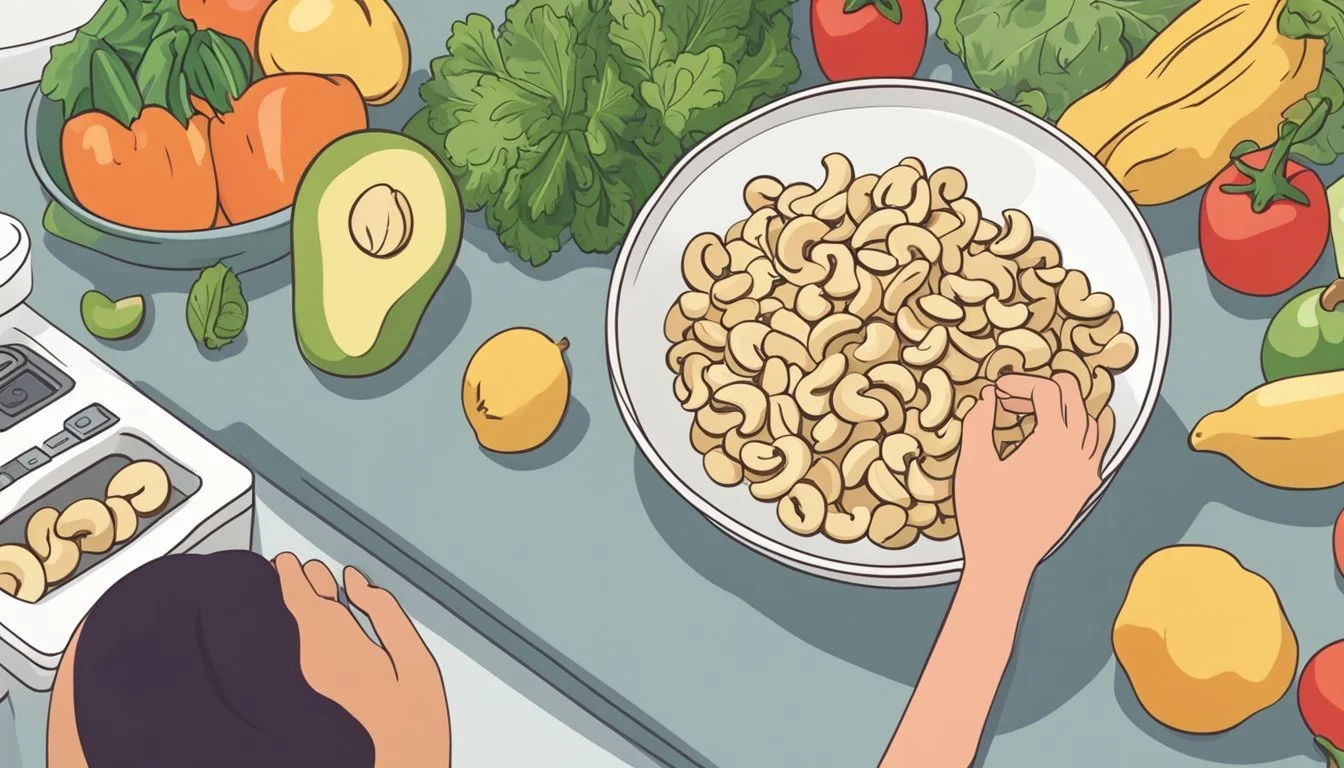Is It Okay to Eat Raw Cashews While Pregnant?
Uncovering the Facts
Eating a well-balanced and nutritious diet is crucial during pregnancy, as the health of both the mother and the developing fetus is highly dependent on the mother's dietary choices. One common question that arises is the safety of consuming raw cashews while expecting. Cashews are known to be a dense source of essential nutrients, which can be beneficial during pregnancy. They bring proteins, healthy fats, and various vitamins and minerals to the table, all of which contribute to the overall well-being of both the mother and the growing baby.
However, there may be concerns regarding raw cashews, as they are not truly "raw" but have undergone a process to remove toxic substances. True raw cashews contain urushiol, which is the same substance found in poison ivy and can be harmful if ingested. Commercially available raw cashews are safe as they've been steamed to remove this toxin. Pregnant women considering adding cashews to their diet should understand the potential benefits, such as the supply of energy and the role in cell repair, but also consider the caloric and fat content, which, if consumed excessively, could lead to unwanted weight gain.
It is also essential for pregnant women to be aware of the risks of allergies when consuming cashews. While they are an excellent source of nutrients, nuts are a common allergen. Introducing them into a pregnancy diet should be done with awareness of any personal or familial nut allergies. In all cases, consulting with a healthcare provider before making significant dietary changes is best to ensure that the chosen foods will support a healthy pregnancy.
Understanding Pregnancy and Nutrition
During pregnancy, a woman's body requires additional nutrients, vitamins, and minerals. It's not just about eating more, but rather ensuring that the food is rich in essential nutrients that support both the mother's health and the baby's development. Nutritional needs increase to support the growing fetus and changes occurring in the maternal body.
Essential Nutrients:
Folate: Crucial for preventing neural tube defects in the fetus.
Iron: Important for oxygen transport; iron demands increase significantly during pregnancy.
Calcium: Required for the development of fetal bones and teeth.
Vitamin D: Works in conjunction with calcium and is vital for bone health.
DHA: An omega-3 fatty acid playing a role in the baby's brain development.
Incorporating a variety of foods into the diet helps ensure that pregnant women get a good mix of these essential nutrients. Healthy fats, such as those found in nuts, are beneficial for fetal development; however, moderation and proper selection are key.
Healthy Fats:
Monounsaturated Fats: Support heart health, found in avocados and certain nuts.
Polyunsaturated Fats: Includes omega-3s, crucial for brain development, available in flaxseeds and walnuts.
The caloric intake typically increases, but it's the nutritional quality of those calories that matters most. Pregnant women should aim for a balanced diet comprising:
Whole grains
Lean proteins
Dairy products
Nutrition during pregnancy sets the foundation for a baby's lifelong health and the well-being of the mother. Pregnant women should consult healthcare providers to tailor their diet to their specific needs, ensuring they receive all the right nutrients in the proper amounts.
Health Benefits of Cashews
Cashews are a nutritious choice for expecting mothers, offering a rich array of vitamins and minerals supportive of maternal health.
Rich Nutrient Content
Cashews are prized for their high content of essential nutrients that are crucial for the developing fetus and the health of the mother. They are an excellent source of magnesium, which is key for muscle relaxation and energy production. A serving of cashews also provides iron, pivotal for preventing anemia, and zinc, important for immune function and cell growth. Copper, folate, and antioxidants are present as well, supporting overall health and fetal development.
Magnesium: Vital for energy production and muscle function.
Iron: Important for oxygen transport to prevent anemia.
Zinc: Essential for immune health and cellular growth.
Copper: Plays a role in iron absorption and cardiovascular health.
Folate: Necessary for fetal development and growth.
Heart Health and Blood Pressure
Cashews contain unsaturated fats, which can contribute to better heart health when consumed in moderation. These healthy fats can help lower bad cholesterol levels and mitigate the risk of heart disease. Additionally, the magnesium in cashews is known to help regulate blood pressure, which is particularly important during pregnancy as high blood pressure can pose risks for both the mother and the baby.
Bone Health
The nutrients in cashews also play a pivotal role in maintaining bone health. Calcium and phosphorus, found in cashews, are essential for building strong bones, which is beneficial for the mother as the fetus grows and places more demand on the mother's skeletal system. Adequate intake of these minerals helps ensure the strength and integrity of bones both during and after pregnancy.
Potential Risks and Allergies
When considering the inclusion of raw cashews in a pregnancy diet, it's crucial to be aware of the potential for allergies and the presence of naturally occurring toxins in raw cashews.
Allergy Considerations
Raw cashews contain compounds that can trigger allergic reactions in some individuals. Nut allergies are among the most common food allergies, and a cashew allergy can manifest in various ways, from mild symptoms such as hives and itching to more severe responses like anaphylaxis, a potentially life-threatening condition that requires immediate medical attention.
Common Symptoms of Cashew Allergy:
Skin reactions (e.g., itching, hives)
Digestive discomfort
Respiratory issues
Anaphylaxis (in severe cases)
Individuals with a personal or family history of nut allergies should approach raw cashews with caution during pregnancy.
Raw Cashews and Toxin Concerns
While often referred to as raw, most cashews available for purchase have undergone a process to remove urushiol, a toxic resin also found in poison ivy. Consuming cashews that have not been properly processed can lead to poisoning, and the symptoms can be more pronounced during pregnancy due to changes in the immune system's responsiveness.
Toxins in Improperly Processed Cashews:
Urushiol
Pregnant women should ensure that any cashews they eat are adequately processed and should consider fully roasted or steamed options to mitigate risks associated with raw cashews.
Cashews During Pregnancy
Cashews, as a nut variety, offer specific nutritional benefits for pregnant women. They are a source of protein, healthy fats, and fiber, but their impact on weight management and blood sugar control requires consideration. They also play a role in digestive health, which is a common concern during pregnancy.
Weight Management
Consuming cashews in moderation during pregnancy can be part of a healthy diet. They are nutrient-dense snacks that provide essential vitamins and minerals, which can be beneficial for both the mother and the developing fetus. However, cashews are high in calories, and this can contribute to weight gain if not consumed in controlled amounts. Pregnant women must balance their caloric intake with their nutritional needs to maintain a healthy weight.
Key Nutrients: Protein, healthy fats, vitamins, and minerals
Consideration: High in calories; should be eaten in moderation
Managing Blood Sugar
The fiber content in cashews can aid in blood sugar control, an important aspect of managing gestational diabetes—a condition that can occur during pregnancy. Fiber-rich foods like cashews slow down the rate at which sugar is released into the bloodstream, thereby preventing spikes in blood sugar levels.
Fiber Content: Helps slow sugar absorption
Gestational Diabetes: Can be managed with a balanced diet including fiber
Digestive Health
Cashews can benefit digestive health due to their fiber content. During pregnancy, constipation is a common issue, and a fiber-rich diet can help alleviate this discomfort. Cashews, when incorporated as part of a balanced diet, provide the necessary fiber to promote regular bowel movements.
Fiber: Aids in preventing and relieving constipation
Effect: Promotes regular digestive movement and health
Incorporating Cashews into Diet
When adding cashews to a pregnant woman's diet, it's essential to choose forms that are not only safe but also cater to the nutritional needs during pregnancy. These nuts offer protein, essential fats, and a range of vitamins, totaling a nutrient-rich option for expectant mothers.
Recommended Forms of Cashews
Raw cashews should be avoided during pregnancy due to potential toxins; however, roasted cashews are safe as the heating process eliminates any harmful substances. Cashew butter and cashew milk are also nutritious alternatives for incorporating the nut's benefits into the diet - they are versatile and can be used in various dishes. Pregnant women should ensure that the cashews they consume are properly prepared and free from harmful contaminants.
Creative Cashew Recipes
Expectant mothers can include cashews in their diet through an array of recipes:
Trail Mix: Combine roasted cashews with dried fruits and seeds for a convenient snacking option.
Smoothies: Blend cashew milk or cashew butter with fruits for a nutritious smoothie.
Salads: Top salads with a handful of roasted cashews for extra texture and nutrients.
These options not only integrate the nutritional value of cashews but also keep the diet varied and enjoyable.
Alternatives for Cashew Allergies
For those allergic to cashews, alternatives like almonds, walnuts, or peanut butter can be used to maintain a healthy intake of protein and essential fats. These substitutes can also be transformed into butters or milks and used as a base for smoothies or other recipes. It's paramount to consult a healthcare provider before making any significant changes to the diet, especially when dealing with food allergies during pregnancy.
Consulting Healthcare Professionals
When expectant mothers consider incorporating raw cashews into their diet, consulting with a healthcare professional is highly advisable. Doctors can provide evidence-based advice, ensuring dietary choices align with the latest scientific understanding and the specific health requirements of the pregnancy.
Communication with a Doctor:
Safety: A doctor can confirm the safety of consuming raw cashews, taking into account the mother's individual health and any potential allergies.
Nutritional Needs: Healthcare providers can personalize dietary recommendations to match the nutritional needs of both mother and baby.
Expectant Mothers' Concerns:
Allergy Risks: Concerns about allergic reactions, particularly sensitivities to urushiol, the compound found in poison ivy and raw cashews, can be addressed.
Nutritional Balance: Doctors can guide mothers to maintain a balanced diet that includes a variety of nutrients essential for fetal development.
Science and Evidence-Based Guidance:
Healthcare practitioners rely on up-to-date research to inform their guidance on dietary choices. They can help interpret scientific studies and translate them into practical dietary advice.
Nursing Considerations:
After childbirth, diet can affect breastfeeding, and healthcare professionals can advise on how to ensure that a mother's diet supports her and her nursing baby's needs.
It is important to remember that while healthcare professionals provide guidance, it is ultimately the expectant mother's decision on how to balance her diet during pregnancy and nursing.
Conclusion
Eating raw cashews during pregnancy can be considered safe when proper food safety practices are observed. They are nutritious and provide beneficial proteins, healthy fats, and essential micronutrients which contribute to a balanced diet.
Proteins: Essential for cell repair and muscle tissue maintenance.
Healthy Fats: Cashews are a source of unsaturated fats, including omega-3 fatty acids, which support fetal development.
Micronutrients: Offering a range of vitamins and minerals, such as iron which is crucial for preventing anemia, and magnesium for bone development and nerve function.
Dietary recommendations suggest that pregnant women include a variety of foods to meet their nutritional needs. Cashews can be a part of this varied diet, provided they are consumed in moderation and come from reputable sources to minimize the risk of exposure to pathogens.
It’s advisable for pregnant women to consult healthcare providers for personalized dietary advice tailored to individual health needs. The inclusion of cashews should be assessed as part of their overall nutritional intake.
To sum up, cashews can be a valuable addition to the diet of a pregnant person, contributing to their well-being and the healthy development of the baby when consumed responsibly as part of a balanced diet.








